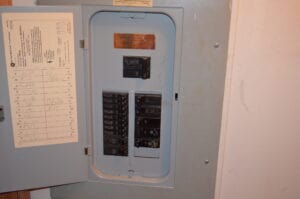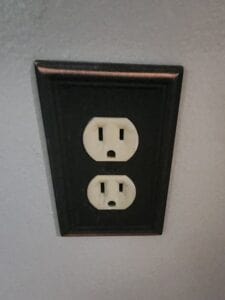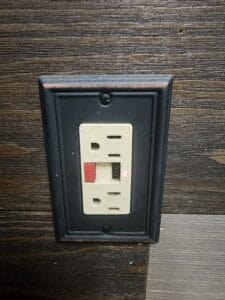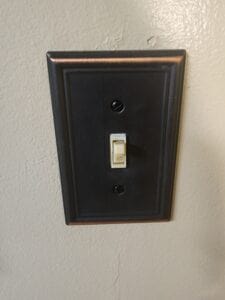Electrical outlets, also called wall receptacles, are crucial components in any mobile home’s electrical system. Unlike traditional homes, mobile homes have unique wiring needs and space limitations that require specific outlet boxes. In this post, we will explore the world of mobile home electric outlets. In this article Replacing Failed Mobile Home Outlets we will discuss all you need to know about replacing these safely.
Replacing Failed Mobile Home Outlets
Mobile homes typically use outlet boxes that are designed to fit their unique wiring needs and limited space requirements. These boxes can accommodate a variety of different types of outlets, including USB outlets that have become increasingly popular in recent years.
Mobile Home Electric Outlets USB
USB outlets provide a convenient way to charge devices without needing a separate power strip or adapter. Elegrp USB wall outlet is one such product that is gaining popularity among small business owners who operate from their mobile homes.
GFCI (ground fault circuit interrupter) outlets are required in certain areas of the home, such as bathrooms and kitchens, to protect against electrical shock. These specialized outlets monitor the flow of electricity and shut off the power if they detect an imbalance in the current.
Wall plates cover the outlet box and wiring and come in various styles and configurations like single gang, double gang or those with USB ports. Wall plates with USB ports can be used for charging devices while saving space by eliminating the need for additional adapters or power strips.
Proper installation of outlets and wiring is crucial for ensuring the safety and functionality of a mobile home’s electrical system. It is essential to hire a licensed electrician for any electrical work done in your home.
If you’re looking to replace older mobile home electrical outlets, it’s important to choose ones that meet current safety standards. Older models may not have GFCI protection or may not be grounded properly which could lead to electrocution hazards.
Understanding the Basics of Mobile Home
Electrical Outlets
Unique Features of Mobile Home Electrical Outlets
Mobile homes are a popular and affordable housing option for many people. While they share many similarities with traditional homes, there are some unique features to consider we will discuss some of the key differences and considerations for mobile home electrical outlets.
One significant difference between mobile home electrical outlets and those found in traditional homes is the voltage they can handle. Mobile home electrical systems are designed to handle a lower voltage of electricity than standard outlets, typically 120 volts. This means that appliances and electronics that require higher voltages may not work correctly or could even be damaged if plugged into a mobile home outlet.
Another important consideration is the wiring configuration of mobile home electrical systems. These systems may have different wiring configurations than traditional homes, so it’s crucial to understand how your specific system is set up before attempting any electrical work or upgrades. Hiring a licensed electrician who has experience working with mobile home electrical systems is highly recommended to ensure that all work is done safely and correctly.
Regular maintenance and inspections of your mobile home’s electrical system can help prevent issues and ensure safe operation. It’s essential to check for any signs of wear or damage, such as frayed wires or loose connections, which could lead to safety hazards like electrocution or fires. If you notice any unusual smells coming from your outlets or circuit breaker box, it’s crucial to address them immediately by contacting a licensed electrician.

Mobile Home Electrical Outlet Wiring
There are some essential considerations that homeowners should keep in mind. One critical factor is ensuring that all wiring meets local building codes and safety standards. This includes using appropriate wire sizes based on the amperage requirements of each outlet and appliance.
It’s also essential to use high-quality materials when wiring mobile home outlets. Cheap or low-quality materials can pose a safety hazard and may not hold up over time. Homeowners should avoid using extension cords or power strips as permanent solutions for powering appliances or electronics.
Another important consideration is the placement of mobile home electrical outlets. Outlets should be placed in convenient locations throughout the home to ensure that residents have easy access to power where they need it most. It’s also essential to consider the number of outlets needed in each room based on the types of appliances and electronics used in that space.

Different Types of Mobile Home Outlets and
Their Functions
Outlets, also known as receptacles, are an essential part of any mobile home’s electrical system. They provide a point of connection for electrical devices to receive power from the home’s electrical system. In this section, we will discuss the different types of mobile home outlets available and their functions.
15-Amp Outlets
The 15-amp outlet is one of the most commonly used outlets in mobile homes. It is designed to handle a maximum load of 1,800 watts and is typically used for small appliances and electronics such as lamps, televisions, and computers. These outlets have two vertical slots that are parallel to each other with a round hole centered below them for grounding purposes.
20-Amp Outlets
The 20-amp outlet is another type of outlet found in many mobile homes. It can handle a maximum load of 2,400 watts and is typically used for larger appliances like refrigerators and air conditioners. These outlets have one horizontal slot and one vertical slot with a round hole centered above them for grounding purposes.
GFCI Outlets
Ground Fault Circuit Interrupter (GFCI) outlets are required by law in certain areas of the home such as bathrooms, kitchens, garages, outdoor areas where water may be present or near swimming pools. GFCI outlets are designed to protect against electrical shock by tripping when there is an imbalance between incoming current and outgoing current. This imbalance indicates that some electricity may be flowing through an unintended path such as through water or through someone’s body who has come into contact with electricity.

Outlet Plates
Outlet plates are covers that fit over the outlet to provide a finished look while also protecting people from accidental contact with live wires inside the outlet box. These plates come in various colors and styles that can match your decor or personal style preferences. They can be purchased at hardware stores or online and are easy to install with just a screwdriver.
Signs That Your Mobile Home Outlet Needs Replacement
Frequent Tripping of the Circuit Breaker
If you are experiencing frequent tripping of your circuit breaker, it could be a sign that your mobile home electric outlet needs replacement. This is because an overloaded or damaged outlet can cause the circuit to trip frequently. An overloaded outlet means that too many appliances are plugged into it at once, which can cause overheating and potentially start a fire.
Replacing your mobile home electric outlet can help prevent this from happening and ensure that all of your appliances are working safely. It’s important to have a professional electrician replace your outlet to ensure that it’s installed correctly and meets safety standards.
Burn Marks or Discoloration Around the Outlet
Another sign that your mobile home electric outlet needs replacement is if you notice burn marks or discoloration around the outlet. This is often caused by overheating due to an overloaded or damaged outlet. Overheating can cause damage to the wiring and insulation, which can lead to electrical fires.
If you notice burn marks or discoloration around your mobile home electric outlet, it’s important to have it replaced immediately. Ignoring this issue could put you and your family at risk of electrical fires.
Loose or Wobbly Outlet
A loose or wobbly mobile home electric outlet is another sign that it needs replacement. A loose outlet can be caused by wear and tear over time, which can make it unsafe for use. A wobbly outlet may also indicate that the wiring inside is loose, which could pose a fire hazard.
It’s important to have a professional electrician replace any loose or wobbly outlets in your mobile home as soon as possible. This will ensure that they are installed correctly and meet safety standards.
Outdated Outlets Without a Year Warranty
If your mobile home has outdated outlets without a year warranty, this is another sign that they need replacement. Outdated outlets may not meet current safety standards and could pose a fire hazard. Without a year warranty, you may not be covered if something goes wrong with the outlet.
Replacing outdated outlets with new ones that come with a year warranty can help ensure that your mobile home is safe and protected. It’s important to have a professional electrician install the new outlets to ensure that they are installed correctly and meet safety standards.

Low Ratings or Negative Reviews (Less Than 3 Stars) on the Outlet
Lastly, if you notice low ratings or negative reviews (less than 3 stars) on your mobile home electric outlet, this could be a sign that it needs replacement. Low ratings and negative reviews may indicate that other people have experienced issues with the outlet, such as overheating or electrical fires.
It’s important to take these ratings and reviews seriously and consider replacing your mobile home electric outlet if necessary. Always choose outlets with high ratings and positive reviews to ensure that they are safe and reliable for use in your mobile home.
How to Replace a Failed Mobile Home Outlet
Turning off the Power Supply to the Outlet
Before replacing a failed mobile home electric outlet, it’s crucial to turn off the power supply to the outlet. This ensures your safety and prevents electrical accidents from happening. You can do this by turning off the circuit breaker that powers the outlet you’re about to replace.
Removing the Cover Plate and Unscrewing the Outlet from the Electrical Box
Once you’ve turned off the power supply, remove the cover plate of the outlet using a screwdriver. After removing it, unscrew and detach the old outlet from its electrical box using a screwdriver as well. Be careful not to damage any wires or connectors during this process.
Disconnecting Wires from Old Outlet and Connecting Them to New One in Same Configuration
Next, disconnect all wires attached to your old mobile home electric outlet carefully. You should take note of which wire is connected where so that you can connect them correctly with your new one later on. If necessary, take a picture or label each wire before removing them.
After disconnecting all wires, connect them back into your new mobile home electric outlet in their respective positions. Ensure that they are tightly connected and secured in place so as not to cause any loose connections.
Looking for outlets for your mobile home or breakers? Look no further click here.
Securing New Outlet in Place and Replacing Cover Plate
Once all wires are securely connected, attach your new mobile home electric outlet onto its electrical box using screws. Tighten them properly but avoid over-tightening as this may damage or break some components of your new outlet.
After securing it in place, replace its cover plate by fixing it back onto your newly installed mobile home electric outlet using screws again.
Turning on Power Supply and Testing New Outlet with Voltage Tester
Now that everything is fixed into place, turn on your circuit breaker again and test if everything works correctly with a voltage tester. If there’s no issue detected after testing, then congratulations! You have successfully replaced a failed mobile home electric outlet.
If you’re unsure about any of these steps, it’s always best to consult a licensed electrician for assistance. Remember that your safety should be your top priority when dealing with electrical components.
If you lose electricity to your mobile home your pipes could freeze up during winter months. Read our article on How to Winterize a Mobile Home.
Safety Precautions When Replacing a Mobile Home Outlet
Turning Off the Power Supply
When replacing a mobile home outlet, safety should be your top priority. Before you begin any work, always turn off the power supply. This will prevent electrocution and other accidents that may occur during the replacement process. Turning off the power supply is easy; all you need to do is locate your home’s electrical panel and switch off the breaker that controls the outlet you want to replace.
Are you interested in selling your mobile home? Visit our article on Sell My Mobile Home.
Using a Surge Protector
Mobile homes are particularly vulnerable to power surges because they are often located in areas with unstable power grids. A surge protector can protect your mobile home’s electrical system from damage caused by power surges. These devices work by diverting excess voltage away from your electronics and appliances, preventing them from being damaged.
Tamper-Resistant Outlets
If you have children in your home, it’s crucial to consider installing tamper-resistant outlets when replacing an old one. Tamper-resistant outlets feature built-in shutters that prevent accidental electrocution by blocking access to live contacts unless both shutters are simultaneously engaged. According to data from the National Fire Protection Association (NFPA), approximately 2,400 children suffer severe shock or burns each year due to electrical receptacles.
Checking for Signs of Tampering or Damage
Before replacing an outlet, make sure to check for signs of tampering or damage on the existing one. Damaged outlets can be hazardous as they may cause sparks or fires if left unattended. If you notice any signs of wear and tear on your outlet such as cracks or discoloration, it’s best to replace it immediately.
Tips for Choosing the Right Mobile Home Outlet Replacement
Choosing the right mobile home outlet replacement can be a daunting task, especially if you don’t know what to look for. Here are some tips to help you make an informed decision and ensure that your new outlet is safe, reliable, and compatible with your electrical system.
Durability and Compatibility
When choosing a new outlet cover, it’s important to consider its durability and compatibility with your mobile home’s electrical system. Look for covers made from high-quality materials that can withstand wear and tear over time. Make sure the cover is compatible with your mobile home’s wiring and circuit breaker to prevent any potential safety hazards.
Reputable Small Business Brands: Replacing Failed Mobile Home Outlets
To ensure quality and reliability, it’s always a good idea to choose an outlet replacement from reputable small business brands. These brands often have a reputation for producing high-quality products that are designed specifically for mobile homes. You can also check online reviews or ask for recommendations from other mobile homeowners in your area.
Looking for outlets for your mobile home or breakers? Look no further click here.
Appropriate Voltage and Amperage Rating
Another important factor to consider when choosing a new outlet is the voltage and amperage rating. Make sure you choose an outlet with the appropriate rating for your specific needs. For example, if you plan on using high-powered appliances or electronics in your mobile home, you’ll need an outlet with a higher amperage rating than if you only plan on using low-powered devices.
Aesthetic Design: Replacing Failed Mobile Home Outlets
While functionality should be your top priority when choosing a new outlet cover, it’s also important to consider the aesthetic design of the cover. Choose a design that matches the interior of your mobile home or adds a unique touch of style. This will not only improve the overall look of your space but also increase its value.
Safety Features
Lastly, prioritize safety by selecting an outlet with built-in features such as surge protection or tamper-resistant outlets. Surge protection will protect against power surges caused by lightning strikes or other electrical issues while tamper-resistant outlets will prevent accidental electrocution, especially for families with young children.
Finding Suitable Switches and Receptacles: Replacing Failed Mobile Homes Outlets
Choosing the right switches and receptacles for your mobile home is crucial to ensure compatibility with the electrical system. In this section, we will discuss some important factors you need to consider when looking for suitable switches and receptacles.
Look for Mobile Home-Specific Switches and Receptacles
When shopping for switches and receptacles, make sure that they are specifically designed for mobile homes. This ensures that they are compatible with the unique electrical systems found in these homes. Using standard residential switches and receptacles can lead to electrical problems, including short circuits and fires.
Consider Portable Surge Protectors
Mobile homes are more susceptible to power surges and voltage spikes than traditional homes due to their location. Therefore, it’s essential to protect your mobile home’s electrical system from such events by using a portable surge protector. One such example is Industries RV Surge Protector, which provides high-speed protection against power surges, voltage spikes, and lightning strikes.
Choose Switches and Receptacles with 125V Rating
Ensure that the switches and receptacles you choose have a 125V rating as this is the standard voltage used in most mobile homes. Choosing a switch or receptacle with a lower voltage rating may not be able to handle the load required by your appliances or lights.
Opt for Dual Switches and Receptacles
Dual switches allow you to control multiple appliances or lights from one convenient location. This feature can save time by eliminating the need to go from one switch or outlet to another when turning on or off different devices. You can also opt for dual USB outlets that allow you to charge multiple devices simultaneously.
Looking for outlets for your mobile home or breakers? Look no further click here.
Easy Installation Package
Some manufacturers offer easy installation packages that include everything needed to install new switches or outlets in your mobile home. These packages typically include mounting brackets, screws, wire nuts, faceplates, etc., making installation hassle-free even if you don’t have prior experience working with electrical systems.
Fire-Resistant Materials
Choose switches and receptacles made from fire-resistant materials to ensure safety in case of electrical problems. Look for products that comply with the Federal Emergency Management Agency (FEMA) guidelines for fire-resistant materials.
Commitment to Quality
When choosing switches and receptacles for your mobile home, choose products from reputable manufacturers who have a commitment to quality. Look for companies that offer warranties on their products and have a good reputation in the industry.
Factors to Consider When Choosing a Mobile Home Switch or Receptacle
Amperage Rating: Choosing the Right Capacity for Your Mobile Home Switch or Receptacle
One of the most important factors to consider when choosing a mobile home switch or receptacle is its amperage rating. This refers to the maximum amount of electrical current that can safely flow through the outlet or switch without causing overheating or damage. It’s crucial to choose an outlet or switch with an amperage rating that matches your specific needs.
For example, if you plan on using high-wattage appliances such as air conditioners, heaters, or electric stoves in your mobile home, you’ll need outlets and switches with higher amperage ratings. On the other hand, if you only plan on using low-wattage devices like lamps and phone chargers, lower amperage ratings may suffice.
Voltage Rating: Ensuring Compatibility with Your Mobile Home’s Electrical System
Another important consideration when choosing a mobile home switch or receptacle is its voltage rating. This refers to the amount of electrical pressure that flows through your home’s wiring. Most mobile homes use 120-volt systems, but some may require 240 volts for certain appliances. This will ensure that you are replacing failed mobile home outlets with the correct replacement.
It’s essential to choose outlets and switches with voltage ratings that match your mobile home’s electrical system. Using incompatible devices can cause serious safety hazards such as electrocution, fires, and damage to electronic devices.
Type of Outlet or Switch: Choosing Based on Functionality and Convenience
There are several types of outlets and switches available for mobile homes, each designed for specific purposes and functions. Some common types include duplex outlets (two sockets), single-pole switches (on/off), three-way switches (for controlling lights from two locations), GFCI outlets (ground fault circuit interrupter), AFCI breakers (arc fault circuit interrupter), USB outlets (with built-in USB ports), and smart outlets/switches (controllable via smartphone apps).
When choosing an outlet or switch, consider its functionality and convenience. For example, GFCI outlets are essential for outdoor areas and bathrooms where water is present, while USB outlets are useful for charging multiple devices simultaneously.
Looking for outlets for your mobile home or breakers? Look no further click here.
Weather Resistance: Ensuring Durability in Harsh Environments
Mobile homes are often exposed to harsh weather conditions such as rain, snow, wind, and extreme temperatures. Therefore, it’s crucial to choose outlets and switches that can withstand these elements without malfunctioning or becoming damaged.
Look for products with weather-resistant features such as waterproof covers, corrosion-resistant materials, and insulated wiring. This will ensure your mobile home’s electrical system remains safe and operational even in adverse weather conditions.
Replacing Failed Mobile Home Outlets: Avoiding Costly Electrical Upgrades
Finally, when choosing a mobile home switch or receptacle, make sure it’s compatible with your existing wiring. Upgrading your electrical system to accommodate new devices can be costly and time-consuming. Therefore, choosing products that work with your current setup can save you money and hassle.
Consult a licensed electrician if you’re unsure about the compatibility of your mobile home’s wiring with specific outlets or switches. They can provide professional advice on which products will work best for your needs while ensuring safety and compliance with local codes.
Failed Mobile Mobile Home Outlets: Essential Things to Know
In conclusion, understanding the basics of mobile home electrical outlets is crucial for maintaining a safe and functional living space. With different types of outlets available, it’s important to know their functions and signs that they may need replacement. When replacing a failed outlet, safety precautions should be taken to prevent accidents.
Choosing the right replacement outlet involves considering factors such as voltage, amperage, and compatibility with your mobile home’s electrical system. It’s also essential to find suitable switches and receptacles specifically designed for replacing failed mobile home outlets.
Using varied writing styles and sentence structures can help convey information effectively while keeping readers engaged. Incorporating slang, idioms, and colloquial language can add personality and make the content more relatable.
Writing in an authoritative tone of voice based on experience, expertise, authoritativeness, and trustworthiness (E-E-A-T) can establish credibility with readers. Addressing the audience in a conversational manner while adhering to guidelines for sentence length and structure can make the content easier to understand.
Replacing Failed Mobile Home Outlets: Conclusion
There is a lot that goes into making sure your mobile home has electricity. Hopefully this article on Replacing Failed Mobile Home Outlets will help you figure out how to keep your outlets working in top shape.
FAQ’s: Replacing Failed Mobile Home Outlets
Can I replace electrical outlets myself?
Yes, you can replace electrical outlets yourself if you have the necessary knowledge and experience with electrical work. Ensure you follow safety precautions, turn off the power, and use the correct tools and materials.
Why do my outlets not work but the breaker isn’t tripped?
Outlets not working even when the breaker isn’t tripped could be due to issues such as a tripped GFCI outlet in the circuit, a loose or damaged wire, or a faulty outlet itself. Troubleshoot by checking GFCI outlets, inspecting connections, and testing the outlet with a voltage tester before considering a replacement.
What to do when multiple outlets stop working?
If multiple outlets stop working, first check for a tripped GFCI outlet that may be cutting power to the others. If that’s not the issue, you may need to investigate the circuit, looking for loose connections or damaged wires, and if necessary, consult an electrician for more complex problems.
How much does it cost to replace a bad outlet?
The cost to replace a bad outlet can vary depending on factors like the type of outlet, labor rates in your area, and any additional work required. On average, the cost for a basic outlet replacement can range from $50 to $100, including parts and labor.
You might also be interested in our article How Much Weight Can a Mobile Home Floor Hold
Be sure to check out: How to Soundproof a Mobile Home.

